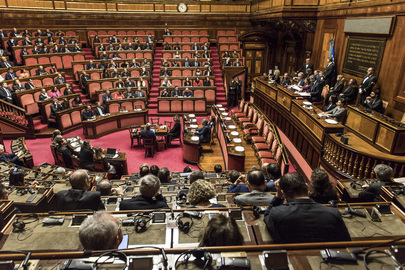Filippo Grandi reported that for the first time in nearly a decade, the number of refugees and other people fleeing war, violence and persecution, has decreased – from 123 million at the end of 2024 to about 117 million today.
“This may seem surprising. Because the world has not become safer – on the contrary,” he said, pointing to conflicts in places such as Sudan, Gaza, Ukraine and Myanmar.
Voluntary return crucial
The “unexpected decrease” has largely been driven by returns to places of origin, mainly Syria and Afghanistan. Most were voluntary, despite continued fragility in these locations.
“The voluntary nature of returns is an important distinction which statistics cannot always capture, as the decrease in the total number of forcibly displaced people also accounts unfortunately for returns that were not voluntary,” said Mr. Grandi.
The return of displaced Syrians “illustrates very clearly the dynamic of voluntariness,” he told ambassadors.
More than a million refugees have come back since the fall of the Assad regime in December 2024, while some two million people inside Syria have returned to communities of origin.
Greater support for Syria
Mr. Grandi stressed the need to support Syria, where teams from his refugee agency, UNHCR, are on the ground providing cash assistance, shelter rehabilitation, documentation and other services to meet immediate needs.
“But much more is needed,” he said. “The international community, and especially donors in the Gulf region and Europe and the international financial institutions, must step up their support in building infrastructure, restoring services, reforming the security sector, restarting the economy.”
Forced returns to Afghanistan
The situation of Afghans, particularly those forced to return from Iran and Pakistan, has been the other driver of lower displacement figures.
The two countries have hosted Afghan refugees for decades, who received access to services “practically on par with nationals.” Furthermore, generations of these refugees, especially women, were educated in local schools.
“But the recent waves of forced returns to Afghanistan deny many Afghan refugees the protection they need, forcing them back to an environment where human rights violations and discrimination are widespread -– especially against women,” he remarked.
Protection and opportunities
Mr. Grandi explained that forced displacement is “a complex phenomenon” as “people may flee a country at the same time as others return to it,” which is the case in both Sudan and South Sudan.
Response is also “a complex challenge”, however “the solution does not lie in restrictions, barriers and pushbacks”.
He suggested that “it is more strategic to look at entire displacement routes and identify measures that provide protection and opportunities to people on the move, and their hosts, as early as possible — before people cross several borders.”
Financial shortfall
Mr. Grandi is leaving UNHCR in the coming weeks “after 10 challenging yet fascinating years.”
Before concluding his remarks, he addressed how the “drastic and sudden reductions in financing” this year have had an impact on the agency and the entire humanitarian sector.
UNHCR faces a $1.3 billion shortfall and expects to receive less than $4 billion this year, out of a budget of $10.6 billion.
He urged donors to help “bridge the gap” and make early flexible pledges for 2026.
Source of original article: United Nations (news.un.org). Photo credit: UN. The content of this article does not necessarily reflect the views or opinion of Global Diaspora News (www.globaldiasporanews.com).
To submit your press release: (https://www.globaldiasporanews.com/pr).
To advertise on Global Diaspora News: (www.globaldiasporanews.com/ads).
Sign up to Global Diaspora News newsletter (https://www.globaldiasporanews.com/newsletter/) to start receiving updates and opportunities directly in your email inbox for free.
































